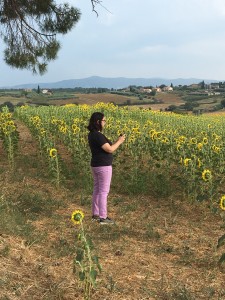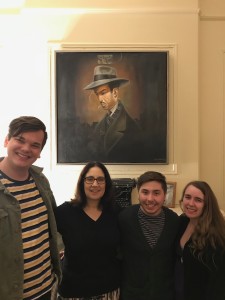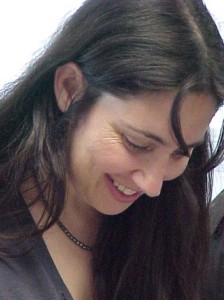 Talking to poet, professor, and translator Judith Baumel about politics is as gratifying as it is about poetics. In our FPP Interview, Baumel speaks of coping with American politics at home and abroad and what gives her hope. She speaks of her Italian year abroad and what her Adelphi University students – Baumel was the founding director of the MFA program – teach her each year. Hear Judith Baumel read this Sunday, November 18th from 6-8pm at Silvana in Harlem with Ibrahim Abdul-Matin, Tanya Domi, Max S. Gordon, Ruby Shamir, Vanessa K. Valdés, and Ricardo Hernandez!
Talking to poet, professor, and translator Judith Baumel about politics is as gratifying as it is about poetics. In our FPP Interview, Baumel speaks of coping with American politics at home and abroad and what gives her hope. She speaks of her Italian year abroad and what her Adelphi University students – Baumel was the founding director of the MFA program – teach her each year. Hear Judith Baumel read this Sunday, November 18th from 6-8pm at Silvana in Harlem with Ibrahim Abdul-Matin, Tanya Domi, Max S. Gordon, Ruby Shamir, Vanessa K. Valdés, and Ricardo Hernandez!
You were the founding director of a creative writing program (Adelphi University) what did the administration of this program teach you about writing and creativity? Ha! That it’s near-impossible to protect one’s time for writing and creativity. Cut that. Here’s another answer. Also true. So much of getting things done in the world involves presenting a narrative. Every step of building and nurturing the MFA program called on my core strength as a writer.
 What have you learned from your students? My students bring me new music and new film and new art to know. They bring new literature that moves them. They also bring new ways to read old literature. They help me not be a fixed person.
What have you learned from your students? My students bring me new music and new film and new art to know. They bring new literature that moves them. They also bring new ways to read old literature. They help me not be a fixed person.
Let’s talk about Italy. How did it feel to stay? How did it feel to return to the US? I translate Italian poetry and travel around Italy frequently. It’s my happy place. It felt selfish to spend my sabbatical there alone (I left behind my husband, my grown children, my 87year old mother) but I decided to be selfish. This was the first extended period in which I dedicated my life to nothing other than my own writing. The Italian pace of life is ideal for me. I woke up late, made a coffee, wrote in bed for a few hours, cooked myself a nice lunch, took a walk, read a lot, had aperitivi with friends, maybe some dinner, went to bed and started it all over the next day. I even managed a version of this schedule during the semester I taught at the University of Genoa. Heaven.
Coming back was a shock.
In Italy I cut back on my consumption of television and radio. This gave me a break from my tendency – my addiction – to ride the 24 hour news cycle. So I avoided the daily despair that comes from listening to the latest outrage and assault to our democracy, our culture, our language.
You write profoundly about politics, especially progressive politics. What gives you hope? What gives you pause? Thanks! What gives me hope are the many many many young people who are building a new political road. Who are walking door to door. Who are marching. I streamed “March for Our Lives” while in Italy and after about ten minutes I was blubbering with gratitude for these strong and smart kids. This week we are beginning to see the real results of the midterm elections and I hope the new, independent, fierce people who won in local and down-ballot races will bring lasting change.
What gives me pause is the extreme discourse of nationalism, the extreme divisions that still prevail. When mainstream Democrats “reach across the aisle” it seems they want to demonstrate that they have principles of comity, etc. But I fear that is not the right way. Writer Aleksander Hemon just published a great essay called “Fascism is Not an Idea to Be Debated, It’s a Set of Actions to Fight.” More and more I’m understanding Red State/Blue State divide as referencing a division between rural and urban communities. This means the areas have fundamentally different and perhaps opposing economic needs. Nothing new in our country. This was the situation at the Continental Congress. I’m in the middle of Andrew Delbanco’s new book The War Before The War. It’s about the Fugitive Slave Act and is a cautionary tale for our time.
Is there a piece of writing– yours or someone else’s–that really speaks to your experiences these days? American Sonnets for My Past and Future Assassin by Terrance Hayes. Riveting. Brilliant. Wild. Heartfelt. After the 2016 election Hayes started writing a poem every day. Collectively, they are a response to the indignities, the ambiguities, the heartbreak, the threats, the violence of our time. They don’t hold back. They speak truth clearly. But they refuse to be fixed. The book is the kind of writing that Walt Whitman called “barbaric yawps” of the ordinary citizen.
 What should the future be? If you let me talk about the future as being (not Michelle Obama style becoming) it’s easy. The future is a country in which every person can vote and every person’s vote counts. In which Black Lives Matter. In which spending to protect the environment matters. In which distributive justice prevails. A country with zero automatic weapons. A country whose highest goal is to love the stranger (the refugee and the immigrant) and the widow and the orphan (the least among us) as ourselves, as the Torah tells us. I do not have a plan to get us from here to there, alas.
What should the future be? If you let me talk about the future as being (not Michelle Obama style becoming) it’s easy. The future is a country in which every person can vote and every person’s vote counts. In which Black Lives Matter. In which spending to protect the environment matters. In which distributive justice prevails. A country with zero automatic weapons. A country whose highest goal is to love the stranger (the refugee and the immigrant) and the widow and the orphan (the least among us) as ourselves, as the Torah tells us. I do not have a plan to get us from here to there, alas.
Tell us about your Harlem. My Harlem is a literary place. It runs east to west from Piri Thomas to Zora Neale Hurston, Langston Hughes, Claude McKay, Ralph Ellison all the way to Marcus Garvey’s pier for the Black Star Line. It’s also a place with a street life that is fun, though as a Bronx girl, I don’t spend as much time in Harlem as I do uptown.
What was your first knowledge of Harlem? My uncle and my father taught at City College. As a kid I visited what felt like a shining city on the hill of Convent Avenue. It was and still is the best of America, of New York. Where an immigrant kid can get a first rate education on a beautiful, aspirational campus. Later I also taught at City College and loved wandering the nearby streets, the Dominican bakeries on Broadway, the houses on Striver’s Row.
Who are writers that we should be reading right now? Recent must-read poetry books: Claudia Rankine’s Citizen. Erika Meitner’s book Holy Moly Carry Me. Ross Gay’s Catalog of Unabashed Gratitude. I’m proud to be in an anthology called Women Of Resistance: Poems for a New Feminism edited by two friends and former students Danielle Barnhart and Iris Mahan. It’s radical and intersectional.
What advice would you give emerging writers today? Read as much and as widely as you can. Write as much as you can. And follow the cartoonist and writer Lynda Barry’s advice. Do not ever ask yourself these two questions: Is it good? Does it suck?
Is there something I didn’t ask you that you’d like to share?
Nah 
